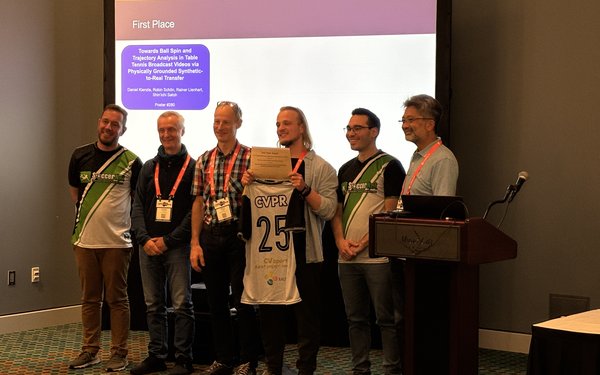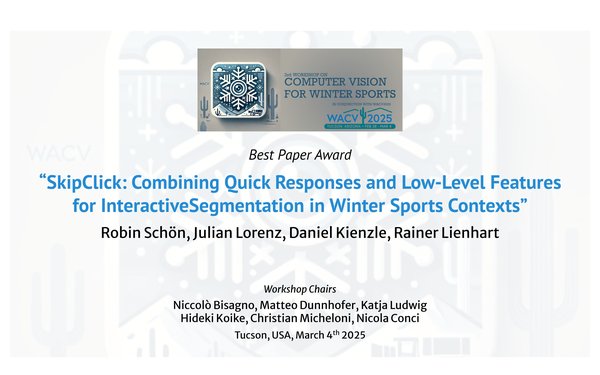News
Research Featured on SportsAI Podcast
Paper accepted to SafeMM-AI at the International Conference on Computer Vision (ICCV 2025)
Our paper "On the Importance of Conditioning for Privacy-Preserving Data Augmentation" by Julian Lorenz, Katja Ludwig, Valentin Haug, and Rainer Lienhart has been accepted to the Workshop on Safe and Trustworthy Multimodal AI Systems (SafeMM-AI) at the International Conference on Computer Vision 2025 and our paper has been selected for an oral presentation at the conference by the reviewers.
?

Paper accepted to SG2RL at the International Conference on Computer Vision (ICCV 2025)
Our paper "CoPa-SG: Dense Scene Graphs with Parametric and Proto-Relations" by Julian Lorenz, Mrunmai Phatak, Robin Sch?n, Katja Ludwig, Nico H?rmann, Annemarie Friedrich, and Rainer Lienhart has been accepted to the 3rd Workshop on Scene Graphs and Graph Representation Learning (SG2RL) at the International Conference on Computer Vision 2025.

Paper accepted on IEEE 8th International Conference on Multimedia Information Processing and Retrieval (IEEE MIPR 2025)
The Paper "HOIverse: A Synthetic Scene Graph Dataset With Human Object Interactions" by Mrunmai Vivek Phatak, Julian Lorenz, Nico H?rmann, J?rg H?hner and Rainer Lienhart has been accepted on IEEE?8th?International Conference on?Multimedia Information Processing and Retrieval (IEEE?MIPR?2025).
?
Best Paper Award at the CVsports Workshop at CVPR 2025

Thesis Defense of Katja Ludwig
Two Papers Accepted at the CVSports@CVPR'25 Workshop
Efficient 2D to Full 3D Human Pose Uplifting including Joint Rotations" by Katja Ludwig, Yuliia Oksymets, et al.

Paper accepted on CVSports at CVPR 2025

Best Paper Award at CV4WS@WACV
?
?

Paper accepted at the CV4ws@WACV 2025 workshop
Paper accepted (Oral) at the European Conference on Computer Vision (ECCV) 2024
The paper "A Fair Ranking and New Model for Panoptic Scene Graph Generation" by Julian Lorenz, Alexander Pest, Daniel Kienzle, Katja Ludwig, and Rainer Lienhart has been accepted for ECCV 2024 as an Oral Paper.
The authors discuss significant flaws in commonly used evaluation protocols for Panoptic Scene Graph Generation. They present a solution to this problem and evaluate existing publications based on the new findings.
Finally, a new state-of-the-art architecture for Panoptic Scene Graph Generation is presented.
More information can be found here: https://lorjul.github.io/fair-psgg/


